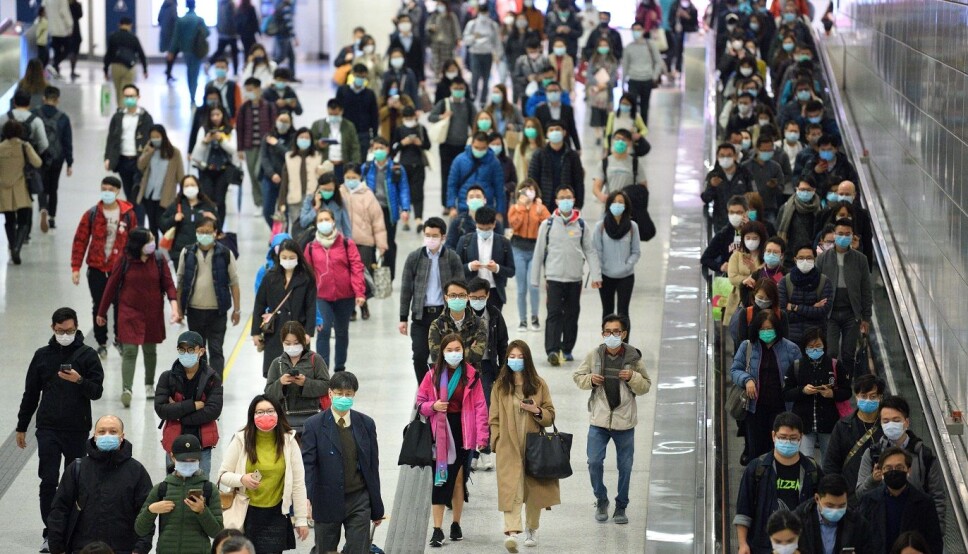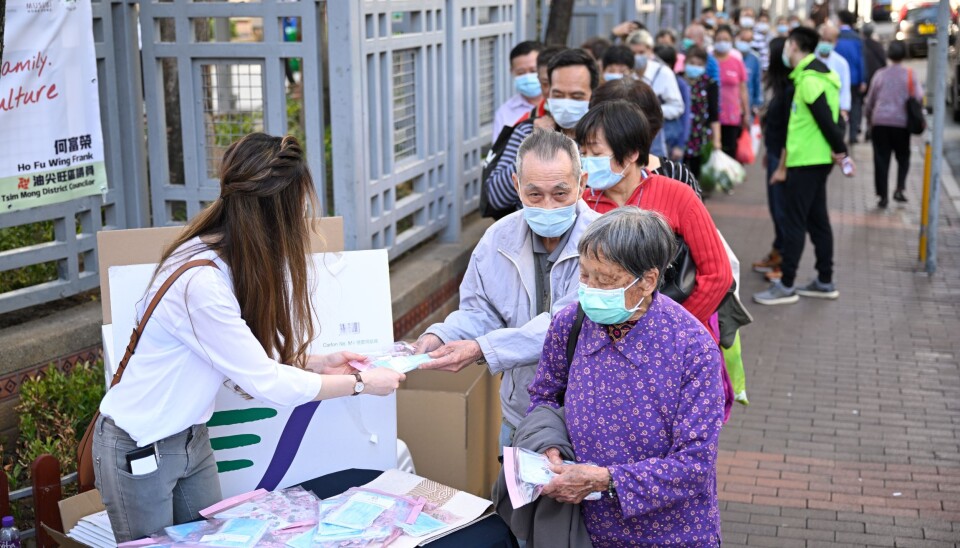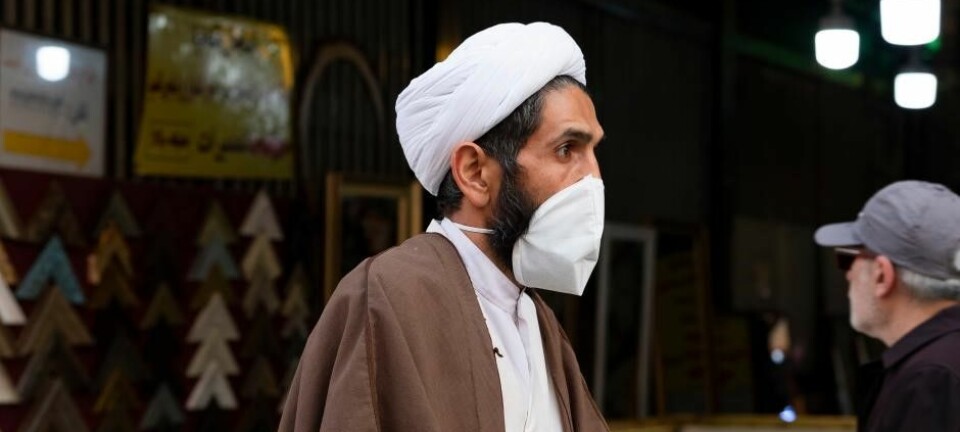Researchers' Zone:

Crises like the COVID-19 pandemic reminds us that we create our own futures
OPINION: How should the COVID-19 crisis be resolved, understood and explained? The solutions and explanations we can imagine will shape tomorrow's society and world order, writes lecturer in history of ideas.
While the COVID-19 crisis is shutting down societies, costing lives and great economic losses, a great battle around how we should understand, interpret and explain the crisis is currently unfolding.
In this article I will focus on one aspect of the COVID-19-crisis: How and why we should be concerned with the future in order to navigate in the current crisis.
Crises are material
The ongoing COVID-19 crisis reminds us that all crises are at one and the same time material and symbolic events.
On the one hand, the CODID-19 crisis is material: sick people, social distance, masks, respirators, fishing- and wild animal markets in Wuhan, collapse of the global traffic network, people working from home, institutions shutting down, breathing problems, military vehicles driving dead people away to incineration in Italy.
The materiality of the crisis is visible in images and news that everyone is presented with every day. The materiality of the crises leaves traces that are scattered all over the world – and will continue to do so for a long time to come.
… and symbolic
The COVID-19 crisis, however, is more than mere materiality, statistics, and cold facts: It is also symbolic. Symbolic in the sense that the crisis creates a space for interpretations, explanations and predictions.
It creates a space for new possible actions and new expectations for what the future might bring:
· From reflections on new possibilities for human solidarity, to the need of shutting national borders and keeping the ‘other’ away from national shores;
· From expectations for stable economic growth to a new and unprecedented far-reaching global economic recession.
· From a future with more people receiving a basic income, to one where China’s authoritarian model triumphs Western democracies.
The crisis activates age-old human narratives and interpretive frames. They range from apocalyptic and doomsday prophecies to conspiration theories about the origins of the virus; from ideas about the crisis as a ‘blessing in disguise’ for the atmosphere, to the crisis as a ‘historical sign’ that reveals the vulnerability of the global economy; from traumatic experiences, to arguments that we now live in a state of exception.
Humans are crisis-interpreting animals
In this respect, the crisis is akin to all other great crises that occurred in the 20th century – and, one is tempted to say, to all previous crises. For as long as there has been crises and catastrophes throughout human history, humankind has tried to conceptualize and interpret such events.
From the plague in the Middle Ages and the subsequent witch-hunts, to the earthquake in Lisbon in 1755 that raised new questions about God’s existence in an evil world, there are certain common traits across historical differences: Humans are crisis- and catastrophe-interpreting animals.
Accordingly, what we are witnessing in our current historical conjuncture is a predictable battle over the right to define the crisis, what we should do about it, and what will take its place.
In many respects the COVID-19 crisis is already different from the financial crisis in 2008 (there are many other relevant comparisons to make).
While many people emphasized that the housing market in the US was the immediate cause of the financial crisis, there was in the aftermath of the crisis an extensive discussion on its multiple causes:
Deregulation, overregulation, neoliberalism, financialization of the American economy since the 1980s, and weakened inspection of the financial sector were just some of the many theories used to explain the crisis.
The acceleration of ’possible futures’
By contrast, the cause of the current crisis has been somewhat less disputed: The virus spread from the Chinese province, Wuhan, to other parts of the world through an unprecedented global traffic network in terms of speed and scale.
However, this is where the agreement ends.
As for what concerns current initiatives for containing the crisis, there is a fierce battle about which epidemiological, political and political economic steps are the right ones to take.
How many people should be tested and how? How strict should the quarantine be? Does it even help to close borders? Where is the limit for collecting data on citizens? Which bailout packages would be enough to prevent an economic collapse?
At the same time, and in close connection with this development, there is a rapid acceleration in the articulation of various future scenarios. We act in crisis based on our expectations of the future.
Some of the questions people raise are: How many people will be infected and die, how fast will COVID-19 spread, how extensive and global will the economic crisis be.
Other questions revolve around whether the state of exception will be prolonged after the crisis, whether global capitalism as we know it will survive, or whether there will be a further proliferation of nationalist, anti-Chinese and anti-globalization sentiments, and what the implications of the crisis has for the climate crisis.
We ’create’ futures in order to strengthen our scope of action
We develop prognoses, predictions, projections, dystopias and – perhaps – utopias. Thus, to some extent we are ‘creating’ new futures.
However, we are not doing this creation ex nihilo. Rather the opposite is true: within a range of scientific disciplines, we have good tools to estimate the implications of global warming, or what happens by not intervening in epi- or pandemics.
On the other hand, there are areas where we cannot just project contemporary trends into the future. These include, for example, debates about what society we would like to be.
We create futures, because we differ from other animals by to a much higher degree being actors ourselves in the history that we are narrating.
Our agency and our scope of action is intimately connected to our abilities for interpretation and ‘future making’.
The future cannot begin
Thus, a central part of the symbolic (interpretive) battle around a crisis is concerned with the necessity of having to orient ourselves towards the future in order to be able to navigate in the present.
We simply need to create futures. As the German sociologist Niklas Luhmann once said, the future cannot begin. We are actually constantly ‘pushing’ the future ahead of us. When future presents become present (when tomorrow becomes today), then they can no longer be characterized as the future, and thus lose their characteristics.

To compensate for the fact that the future cannot begin, we create ‘present futures’ – that is we imagine what the world will look like in a day, a week, a month and in a year, if we chose to do A, B or C.
This is because, as beings that act and orient ourselves in time and space, we need an idea of what the future will bring.
In our current predicament, we are therefore witnessing an acceleration of debates on which possible future lies ahead of us—and which future we want.
Possible future crises
For the very same reason, some forms of political actions are not only orientated towards possible futures generally, but towards ‘possible future crises’ specifically.
We have various kinds of policies for preventing future crises and catastrophes.
It is climate politics concerned with deepened climatic changes, acting on future emergencies by raising CO2-taxes in the present.
It is financial regulation that seeks to prevent future financial crises, such as the Glass-Stegall Act, adopted after the crises in the 1930s, or the Dodd-Frank Act (2010) under Obama after the 2008-crises.
It is counter-terrorist measures that tries to prevent future terrorist attacks through, for example, controversial ‘pre-emptive’ attacks against possible future terrorists, which has been standard American practice since 2002.
And finally, it is epidemiological security measures that are designed to prevent the spread of future epidemics, as it was, for example, suggested by many scientists after the Ebola virus epidemic in West Africa, but also in relation to earlier epidemics such as the SARS outbreak in 2003.
From health crisis to economic crisis
This situation – i.e. warding off future crises – is one that we are actually also living in now, because the crisis changes its character as we move ahead.
Aid packages, quarantines, tests, the central bank’s monetary policies, information campaigns, etc. are not just enacted in the present for the sake of the present. They are also enacted because of high risk that the current health- and economic crisis will not only lead to a depended global pandemic, but also see a more substantial shift from economic recession into a growing liquidity crisis and a much severe financial panic.
Such a financial panic could accelerate the negative economic spiral to such a degree that we could find ourselves in a crisis much worse than 2008. This is one of the ‘present futures’ we are facing.
Governments and central banks are acting on the present, but also on these ‘present futures’. They are dealing with this possible future crisis by attempting to restore confidence. Also in this regard are we creating our own future: Negative – or positive—expectations can become self-fulfilling.
The COVID-19 crisis can make us forget other crises
Crises are material but also comprehensive interpretive battles. These struggles are crucial, because they help create the framework for contemporary and future political actions.
In this article I have particularly emphasized that these interpretive battles involve the creation of future scenarios which are necessary for orientation in any crisis, including this one.
That being said, there are also many other aspects of the interpretive battles around crises that could be explored further.
As the British political scientist David Runciman has shown, our perspectives on crises are heavily influenced by the place from which we experience and interpret the world.
One could argue that the West has been ill prepared to tackle the pandemic, because the West has been affected less by more recent and comparable epidemics such as Ebola and SARS compared to other countries. Similarly, the Spanish Flu is simply too far back in time (1918) to be part of our collective memory.
At the same time, it is also a crucial point that the crisis we are experiencing right now can easily result in a shift of our perspectives, where other ongoing crises – for example, climate, refugee, continued violations of human rights in many countries, etc. – are neglected or deprioritized, as so often seen before.
Read this version in Danish at Videnskab.dk’s Forskerzonen.
References:
Christian O. Christiansens profile (AU)
'Learning from Ebola Virus: How to Prevent Future Epidemics', Viruses (2015), DOI: 10.3390/v7072797
'Critical Theories of Crisis in Europe', Rowman & Littlefield International (2016)






